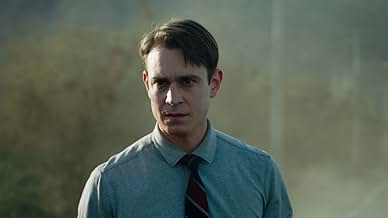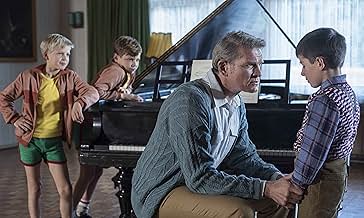O culto germânico 'Colonia Dignidad' abusou de crianças, torturou e matou prisioneiros em seu complexo secreto. Agora, sem o ditador chileno Pinochet, Leo Ramírez, um jovem promotor federal,... Ler tudoO culto germânico 'Colonia Dignidad' abusou de crianças, torturou e matou prisioneiros em seu complexo secreto. Agora, sem o ditador chileno Pinochet, Leo Ramírez, um jovem promotor federal, deve levar seu líder Paul Schaefer à justiça.O culto germânico 'Colonia Dignidad' abusou de crianças, torturou e matou prisioneiros em seu complexo secreto. Agora, sem o ditador chileno Pinochet, Leo Ramírez, um jovem promotor federal, deve levar seu líder Paul Schaefer à justiça.
- Prêmios
- 1 vitória e 1 indicação no total
Explorar episódios
Avaliações em destaque
It's amazing to see that the streaming channel Walter Presents is still in operation. This channel seems to look for all the second rate or failed TV series in Europe and rebroadcast them. Dignity, is no exception to this. The story is told by constantly changing timelines that lead to total chaos and confusion for the viewer. The scenes are non-linear, just stuck together randomly. Some scenes just seem to have no relation to the one before or the one after. As with many European productions, the actors tend to stare at one another for prolonged periods, or just stare into space. The series really does very little to tell this important story.
Colonia Dignidad was a very dark chapter in the German and in the Chilenean history. We should handle this topic with respect, not as an interesting idea for a fancy fake story.
It is filmed good, the actors play quite well, but still there is the sad feeling about endless fake facts smearing dirt on this serious history.
Dignidad
Colonia Dignidad was a settlement of German "colonists" founded in 1961 near Parral, a town in central Chile, by former Hitler Youth member Paul Schäffer. During the Pinochet dictatorship, it served as a detention and torture center. On the other hand, the Colony "adopted" male children from the area, who, along with their own members, were abused by Schäffer. It was a German microcosm with a rigid adherence to Protestantism on the part of its members, with Schäffer as the undisputed and all-embracing spiritual leader. It had the only hospital in the area open to the surrounding population, which created a curious support and complicity of the locals with the Colony.
The series Dignidad (a German-Chilean co-production and spoken in both languages) takes place in two periods: in 1977, during the Pinochet dictatorship and in 1997. In this year a judge entrusted the prosecutor Leonardo "Leo" Ramírez (Marcel Rodríguez) with instructing the Schäffer's arrest on child abuse charges. To do this, he will have the support of detective Pamela Rodríguez (Antonia Zegers) to raid the Colony.
The plot will reveal the deep relations of the past of "Leo" with the Colony and an intricate network of complicities at the political, police and diplomatic level, still firm in 1997.
The flashbacks of 1977 are the hardest (and most accomplished) facet of the series: we see some of the characters as children living in the colony that mix of fairy tale with bucolic German songs and dances with typical horror story of the organizations closed and sectarian.
The 1997 story gives an account of the comings and goings of the prosecutor's siege of the Cologne and Schäffer, also impregnated with a personal question. The series aims to reflect an arduous process, increasingly lonely and with many obstacles. But the sequence, instead of accumulating tension, creates a feeling of repetition and a certain fatigue in the viewer. This also occurs because the plot of complicities does not end up taking flight or intensity (as it did in the much superior La Jauría). Perhaps among the most salient is the romantic tension between some of the protagonists.
Rodríguez looks a bit cold in her prosecutor Ramírez and, as always, Zegers stands out in a role similar to her detective in La Jauría.
It is curious that Schäffer (Götz Otto) and the head of the Cologne hospital, Hausmann (Devid Striesow) look exactly the same in 1977 and in 1997. Aspects related to the outcome are not entirely clear either.
In short, a political thriller about the attempt to end the impunity of Colonia Dignidad and its leader Paul Schäffer, which works better in its flashbacks than in its present, since it fails to balance the elements it displays and endow everyone with the same interest.
The series Dignidad (a German-Chilean co-production and spoken in both languages) takes place in two periods: in 1977, during the Pinochet dictatorship and in 1997. In this year a judge entrusted the prosecutor Leonardo "Leo" Ramírez (Marcel Rodríguez) with instructing the Schäffer's arrest on child abuse charges. To do this, he will have the support of detective Pamela Rodríguez (Antonia Zegers) to raid the Colony.
The plot will reveal the deep relations of the past of "Leo" with the Colony and an intricate network of complicities at the political, police and diplomatic level, still firm in 1997.
The flashbacks of 1977 are the hardest (and most accomplished) facet of the series: we see some of the characters as children living in the colony that mix of fairy tale with bucolic German songs and dances with typical horror story of the organizations closed and sectarian.
The 1997 story gives an account of the comings and goings of the prosecutor's siege of the Cologne and Schäffer, also impregnated with a personal question. The series aims to reflect an arduous process, increasingly lonely and with many obstacles. But the sequence, instead of accumulating tension, creates a feeling of repetition and a certain fatigue in the viewer. This also occurs because the plot of complicities does not end up taking flight or intensity (as it did in the much superior La Jauría). Perhaps among the most salient is the romantic tension between some of the protagonists.
Rodríguez looks a bit cold in her prosecutor Ramírez and, as always, Zegers stands out in a role similar to her detective in La Jauría.
It is curious that Schäffer (Götz Otto) and the head of the Cologne hospital, Hausmann (Devid Striesow) look exactly the same in 1977 and in 1997. Aspects related to the outcome are not entirely clear either.
In short, a political thriller about the attempt to end the impunity of Colonia Dignidad and its leader Paul Schäffer, which works better in its flashbacks than in its present, since it fails to balance the elements it displays and endow everyone with the same interest.
This is an heavily imagined rewriting of the days and weeks leading up to the flight of Paul Schäfer from the "Colony" he had founded in Chile after escaping criminal charges in Germany. Dead for many years, Shafer's legacy lives on in the many lives he shattered. Using invented characters, it recounts, partly in flashback, the horrors of life in the colony where abuse of children was rife as detailed in the series.
The colony, set up as a charitable association, performed this role for the surrounding area with its hospital and educational facilities. However, it was a front for a cult centred on Schäfer as God's representative on the one hand and a conduit for illegal arms transfers alongside torture and abuse on the other.
In the series a dogged prosecutor and a cop take on the power of the colony still protected by powerful men left over from Pinochet's rule and for whom it had "disappeared" hundreds of people. We know from history that Schäfer was ousted, so the thrust of the plot leads to that end via many a twist and turn.
It's worth a watch even though much doesn't ring true. Why weren't the goodies, who had no protection and were living openly, simply bumped off? Nonetheless, I saw it through to the end and wasn't sorry.
The colony, set up as a charitable association, performed this role for the surrounding area with its hospital and educational facilities. However, it was a front for a cult centred on Schäfer as God's representative on the one hand and a conduit for illegal arms transfers alongside torture and abuse on the other.
In the series a dogged prosecutor and a cop take on the power of the colony still protected by powerful men left over from Pinochet's rule and for whom it had "disappeared" hundreds of people. We know from history that Schäfer was ousted, so the thrust of the plot leads to that end via many a twist and turn.
It's worth a watch even though much doesn't ring true. Why weren't the goodies, who had no protection and were living openly, simply bumped off? Nonetheless, I saw it through to the end and wasn't sorry.
Você sabia?
- CuriosidadesProject funded by the Chilean TV Council (CNTV).
Principais escolhas
Faça login para avaliar e ver a lista de recomendações personalizadas
- How many seasons does Dignity have?Fornecido pela Alexa
Detalhes
Contribua para esta página
Sugerir uma alteração ou adicionar conteúdo ausente


![Assistir a Tráiler [OV]](https://m.media-amazon.com/images/M/MV5BYTE1OGJiYjgtYzhkNy00MDQyLTkyYTEtNzAyMDZhNzY4MThiXkEyXkFqcGdeQXRyYW5zY29kZS13b3JrZmxvdw@@._V1_QL75_UX500_CR0)















